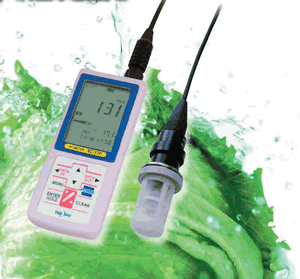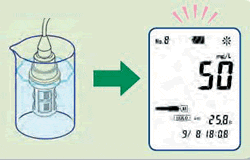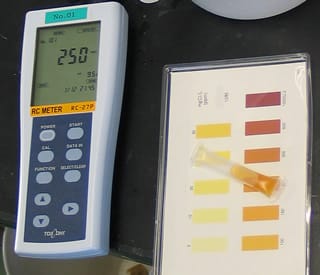For Chlorine Residual concentration in Disinfection Wash Waters
The New Residual Chlorine Meter, Hig range, 20-300 provides a very fast measurement of residual chlorine by the use of a polarographic sensor. The updated version includes a larger results memory of 1000 data points and the ability to use rechargeable batteries.
The meter is reagent and membrane free. It can easily be calibrated against other methods including DPD or titration.
The RC-37P is mainly designed for use with chlorine or sodium hypochlorite disinfection water and used for measuring the disinfection concentration of free hypochlorous acid wash solutions commonly used for cleaning and disinfection of water supply lines, food manufacturing facility and produce disinfection waters and cleaning solutions.
This unit is very similar in operation to the RC-31P low level chlorine meter, but uses a modified sensor for an extended range of measurement. (20mg/L up to 300mg/L).
A unique beads polishing system incorporated at the electrode system maintains the electrode in good working condition, free of interferences at the gold microelectrode, and ensures stable measurement.
The meter also indicates the sample temperature and includes a built-in-clock. The instrument can store1000 sets of results (measurement, temperature and time) in memory for later retrieval. Power is provided by two standard AA batteries or rechargeable batteries or an AC adapter.


Specifications
| Measuring Method | Polarographic method |
| Indication | digital display, residual chlorine, temp., and time simultaneous |
| Range: | Residual
Chlorine:20 to
300 mg/L(ppm) Temperature: 0 to 45 degrees C. |
| Repeatability | Residual
Chlorine: High Mode: +/-30mg/l or less at 25C Low mode: +/- 40mg/l or less at 25C |
| Response time | High Mode:
1 minute 30 seconds or less (at 25C) Low Mode: 1 minute or less (at 25C) |
| Water Conditions | pH 8.0 to 10.0, Conductivity 30-90 mS/m(300-900 uS/cm) |
| Interferences | Oxidation/Reducing Substances |
| Temp. Compensation | Automatic (0-40 C) |
| Calibration | by coefficient input method/correlation to colorimetric or alternate technique |
| RS-232 C Output | Standard |
| Power Source | 2x AA cells, or nickel hydride rechargeable batteries or AC adapter |
| Dimensions / weight | Main Body:
68mm(W) x 173(H) x 35(D) Approx. 280g |
Note: Extract from produce
may cause measurement error in wash solution after washing sample. Certain
samples may not be able to be measured if reducing agents are present such
as tannins, or significant dirt and mud is present. High concentration of
hypochlorous acid, electrolysis solutions of hypochlorous acid, and strong
acid solutions cannot be measured.

What is Residual Chlorine?
The New Residual Chlorine Meter, Hig range, 20-300 provides a very fast measurement of residual chlorine by the use of a polarographic sensor. The updated version includes a larger results memory of 1000 data points and the ability to use rechargeable batteries.
Testing for Residual Chlorine is very common in water treatment. The word, "residual", means remainder or that which is left. This test is made to measure the amount of chlorine remaining in the sample at the time the test is made.
DKK-TOA's Model RC-37P is portable and can be easily brought to and used in the field or plant.
Product Information for RC-37P
| RC-37P | Portable Residual Chlorine Meter with std accessories - grab sampler |
| Portable meter complete with digital LCD display. Standard Cell includes Electrode ELM-001 (EM). Meter complete with sensor, measuring container, beads polishing kit, hand strap, vinyl case, instruction manual and batteries. |
Accessories and Consumables for the RC-37P
| ELM-001 (EM) | Residual Chlorine Electrode for high concentration with calibration memory function, 1 meter cable and beads cleaning kit. |
| 01Z00005 | Beads Polishing Kit |
| 6288300K | Maintenance kit, DPD check set and electrode cleaning agent |
| EPS-G | External Printer, 60mm regular roll paper. |
Options for RC-37P
| 118N062 | RS-232C connection cable, 2M, D-sub9P |
| OAA00001 | AC Adapter |
| GP-LOG | Data Acquisition software for PC |
Why Measure Residual Chlorine?
Chlorination has long been the conventional method for disinfection as it is effective and inexpensive. One must ensure the water wash system has a suitable concentration of chorine for a suitable period of time to ensure effective inactivation of bacteria and viruses.
These checkpoints are typically monitored by small hand held devices. The advantage of DKK-TOA's Model RC-37P is that it can store data for later retrivel and it does not require any reagents to perform its measurement.
Increasingly stringent requirements, growing awareness and understanding of the effects of chlorine on the environment, product quality and greater need for process optimization are strongly prompting many companies to more fully optimize the performance, reliability and safety of their chlorination programs.